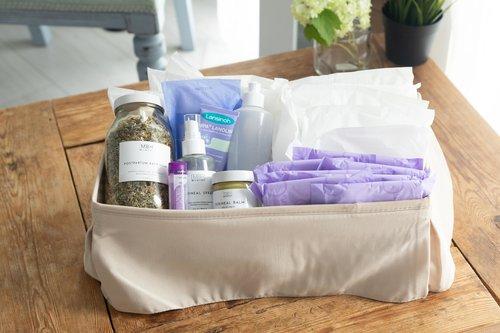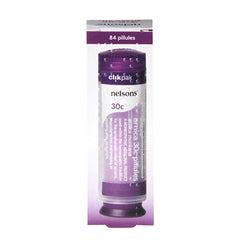
Postnatal Recovery: Postpartum Care Kit Checklist
Share

It’s amazing how much time we tend to spend preparing for baby to arrive…at least we did, but neither of us actually gave much thought to what the days following birth would be like and felt rather unprepared and ill-equipped to deal with the recovery period.
One of the things that we wish we did was create some sort of checklist of the things that we needed to help with our postpartum recovery, something like our hospital checklist.
We were constantly on Amazon those first few weeks because well Prime is amazing! topping up on maternity pads, breast pads and other essentials, but we wish we were a bit more prepared and organised once baby was here.
So here is our complete postpartum care kit for a speedy recovery after giving birth. It’s a good idea to cross everything off your postpartum recovery checklist during your 3rd trimester - you can do this the same time you are doing your list for you hospital bag.
Netflix (or any streaming service you use)
Binge watching your favourite shows or discovering new finds will be your new norm in the first few weeks postpartum, even if you don’t currently have a TV watching addiction.
I loved to sit on the couch with all my supplies within easy reach, including baby changing essentials and snacks, binging on my favourite series while cuddling or feeding the boy. It was the perfect time to catch up on my shows and movies and I found quite a few gems too. - N.
Comfy clothes
I lived in joggers/yoga pants and a t-shirt for months postpartum, the yoga pants were great for recovery because it was really comfy and didn’t irritate my C-section scar.
I actually didn’t put on real clothes for quite a while postpartum, and it was AMAZING. Having a nice comfy robe can also be great because it keeps your boobs “easy access” for nursing, and it’s so easy to cover up if someone comes to the door. - N.
Nursing Bras
These are a must have, and you will need them from day one. I actually preferred the cotton spandex maternity bras like these ones over traditional nursing bras, GAP also have similar ones that were really comfy as well.
I found them a lot more comfortable especially at night as I normally hate sleeping in a bra and liked the fact that the straps were wide and comfy. They worked really well for feeding and I had no issues keeping breast pads in place. - N.
Breast Pads
Even if you don’t plan to, or can’t breastfeed, breast pads are a must. I really liked the Tommie Tippee ones mainly because they were individually wrapped and easy to carry.
I also liked that they were really thin and didn’t get too bulky when they were full and you can’t see them through your bra which was a bonus. I usually picked them up at Asda or stocked up from Boots when they had them on offer. - A.
Nipple Cream and Nipple Shields
Breastfeeding is definitely not easy! Even if it goes WELL you’re likely to have some pain for the first few weeks.
Nipple cream or balm is really good to have on hand, I got the Lansinoh nipple cream but didn’t use it much as I found it too thick and a bit painful to apply to cracked nipples. I ended up using plain coconut oil instead.
I personally didn’t use a nipple shield but a lot of mums have said that they’ve found them really useful in the first week or two so good to have on hand.
Don’t be afraid to use them if you need to as they won’t completely wreck your breastfeeding journey… what could wreck your journey is being in so much pain that you quit! - A.
Brief-Style maternity pads, maternity pads and black cotton knickers
Brief-Style Maternity Pads were a LIFESAVER the first few weeks! They are the best option when you are losing a lot of blood, and I personally found them to be fuss-free.
I started using these immediately after birth – they were really comfortable, absorbent and super convenient. I didn’t have to worry about leaking and I just tossed them in the bin as you would with normal pads.
I used these for the first 2 weeks postpartum for the heavy bleeding then switched to maternity pads for about another 2 weeks then regular pads when it was more like a light period and liners once it was just spotting.
Some of my friends have said they prefer pads after birth. If you do, wear underwear that is breathable and that you don't cherish as you will probably end up throwing them away if you experience leaks.
M&S and Primark do some really comfy black granny panties that work really well. Also if you are just doing maternity pads make sure you stock up as you will need quite a lot. - N.
Painkillers and Stool Softeners
Have some painkillers in your postpartum kit as they will come in handy and are essential if you’ve had a C-Section.
Stool softeners are a really good idea even if you feel ok “downstairs”, having that first poo can be a b*tch especially if you've had stitches after tearing or an episiotomy. Stool softeners can make the process a lot easier. - N.
A Perineal Spray
For my 2nd baby I used MBH Perineal Spray on my bits after giving birth – it was literally a lifesaver! It had a really numbing effect and helped to it feel less swollen/painful. It also helped with the stinging after have a wee.
The Spray is made with a base of witch hazel which is a natural, skin soothing remedy that helps reduce inflammation and swelling, plus it has great wound healing properties which makes it an ideal remedy for reducing vaginal swelling and swelling of haemorrhoids. - A.
Perineal Balm
A Perineal Balm or salve is great to soothe your tender, bruised or swollen perineum post birth. It can also help to relieve anal itching, pain and irritation, as associated with piles or haemorrhoids pre and post birth.
Worried about your risk of damaging the perineum during childbirth? Prenatal perineal massage has been shown effective in preventing the need for episiotomy and a decrease in the amount of tearing a woman has during her birth. This is particularly effective in women having their first baby.
You can help to prepare the skin for birth by applying a perineum balm or oil to lubricate the perineum region. Our Perineal Massage Oil can help improve the skins suppleness ahead of childbirth. You can use it for perineum massages from 34 weeks.
Peri Bottle
It bewilders us why the Peri Bottle isn't widely recognised as a hospital bag essential. Probably because they are not readily used or available in the UK. It was a definite #labourhack for me!
These are a necessity for the first toilet trip after pushing...(we'll talk more about that in another post). If you experience vaginal tearing, swelling or just tenderness, just fill it up with warm water and squirt it in the area while having a pee and thank me later.
It’s also great for cleansing so If you have more than one bathroom in your house, just have one for each, and one for the diaper bag to make life easy. - A.
Bath Herbs, Epsom Salts and Lavender oil for a Sitz Bath
Sitz baths are one of our favourite postpartum recovery tips. It is essentially a warm, shallow bath or sitz pan with bath herbs or salt soak which can feel like the ultimate relief once you’ve given birth.
Not only is it soothing can also encourage the healing process, increase your circulation, reduce swelling and ease itching. -A.
Arnica supplements 30c

Not many know about the benefits of Arnica, a homeopathic super remedy for bruising and wounds. Having used it after both births, I can say that it had a positive effect on my recovery. Any grazing I experienced was expedited by the supplements. -A.
Having a baby is hard work and you deserve time to rest and snuggle with your baby while you recover from labor and adjust to new mom life!
If you make sure to have your postpartum recovery checklist all “checked off” and everything waiting for you, you won’t have to think about anything but baby.









2 comments
This all sounds amazing and I hope it is as effective as it all sounds for my daughter 🙏
Postnatal Recovery: Postpartum Care Kit Checklist" is an invaluable guide that serves as a beacon of support for new mothers as they embark on their postpartum journey.https://mumtouch.com/diy-postpartum-care-kit/